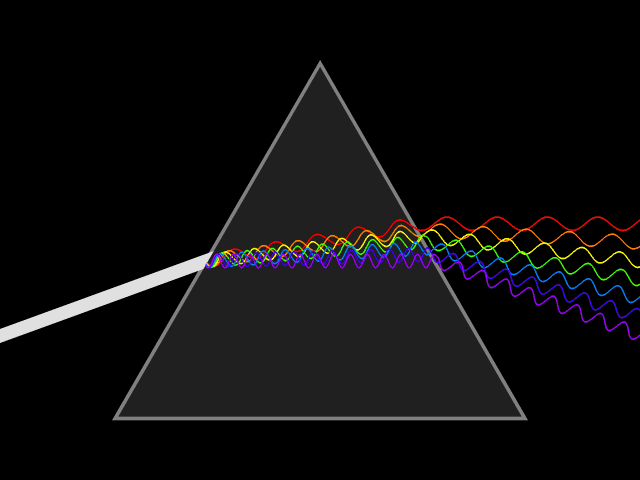Файл:Light dispersion conceptual waves.gif
Light_dispersion_conceptual_waves.gif ((640 × 480 пиксель, файл күләме: 1,14 Мб, MIME-төр: image/gif), цикллы, 90 кадр, 4,5 с)
Файл тарихы
Файлдың күрһәтелгән ваҡытта ниндәй өлгөлә булғанын ҡарар өсөн баҫығыҙ: Дата/ваҡыт
| Дата/ваҡыт | Миниатюра | Үлсәмдәре | Ҡатнашыусы | Иҫкәрмә | |
|---|---|---|---|---|---|
| ағымдағы | 17:09, 6 апрель 2010 |  | 640 × 480 (1,14 Мб) | Kalki | Reverted to version as of 04:14, 27 February 2008 |
| 17:07, 6 апрель 2010 |  | 640 × 480 (1,17 Мб) | Kalki | Reverted to version as of 03:31, 27 February 2008 | |
| 04:14, 27 февраль 2008 |  | 640 × 480 (1,14 Мб) | LucasVB | ||
| 03:31, 27 февраль 2008 |  | 640 × 480 (1,17 Мб) | LucasVB | {{Information |Description=Copnceptual animation of dispersion of light in a prism. Using waves. |Source=self-made |Date=2008-02-27 |Author= Lucas V. Barbosa (aka Kieff) |Permission=Public domain |other_versions=Light_dispersion_conceptual. | |
| 04:10, 24 декабрь 2007 |  | 640 × 480 (348 Кб) | LucasVB | {{Information |Description=Dispersion of light inside a prism. Now with waves. |Source=Self |Date=2007-12-24 |Author=Lucas V. Barbosa |Permission=Public Domain |other_versions=Image:Light_dispersion_conceptual.gif }} |
Файл ҡулланыу
Был файлды киләһе 2 биттәр ҡуллана:
Файлды глобаль ҡулланыу
Был файл түбәндәге википроекттарҙа ҡулланыла:
- af.wikipedia.org проектында ҡулланыу
- am.wikipedia.org проектында ҡулланыу
- ar.wikipedia.org проектында ҡулланыу
- ary.wikipedia.org проектында ҡулланыу
- ast.wikipedia.org проектында ҡулланыу
- as.wikipedia.org проектында ҡулланыу
- azb.wikipedia.org проектында ҡулланыу
- az.wikipedia.org проектында ҡулланыу
- bcl.wikipedia.org проектында ҡулланыу
- bg.wikipedia.org проектында ҡулланыу
- bn.wikipedia.org проектында ҡулланыу
- bn.wikiquote.org проектында ҡулланыу
- bs.wikipedia.org проектында ҡулланыу
- ca.wikipedia.org проектында ҡулланыу
- ceb.wikipedia.org проектында ҡулланыу
- cs.wikipedia.org проектында ҡулланыу
- cy.wikipedia.org проектында ҡулланыу
- da.wikipedia.org проектында ҡулланыу
- el.wikipedia.org проектында ҡулланыу
- en.wikipedia.org проектында ҡулланыу
Был файлды глобаль ҡулланыуҙы ҡарарға.


